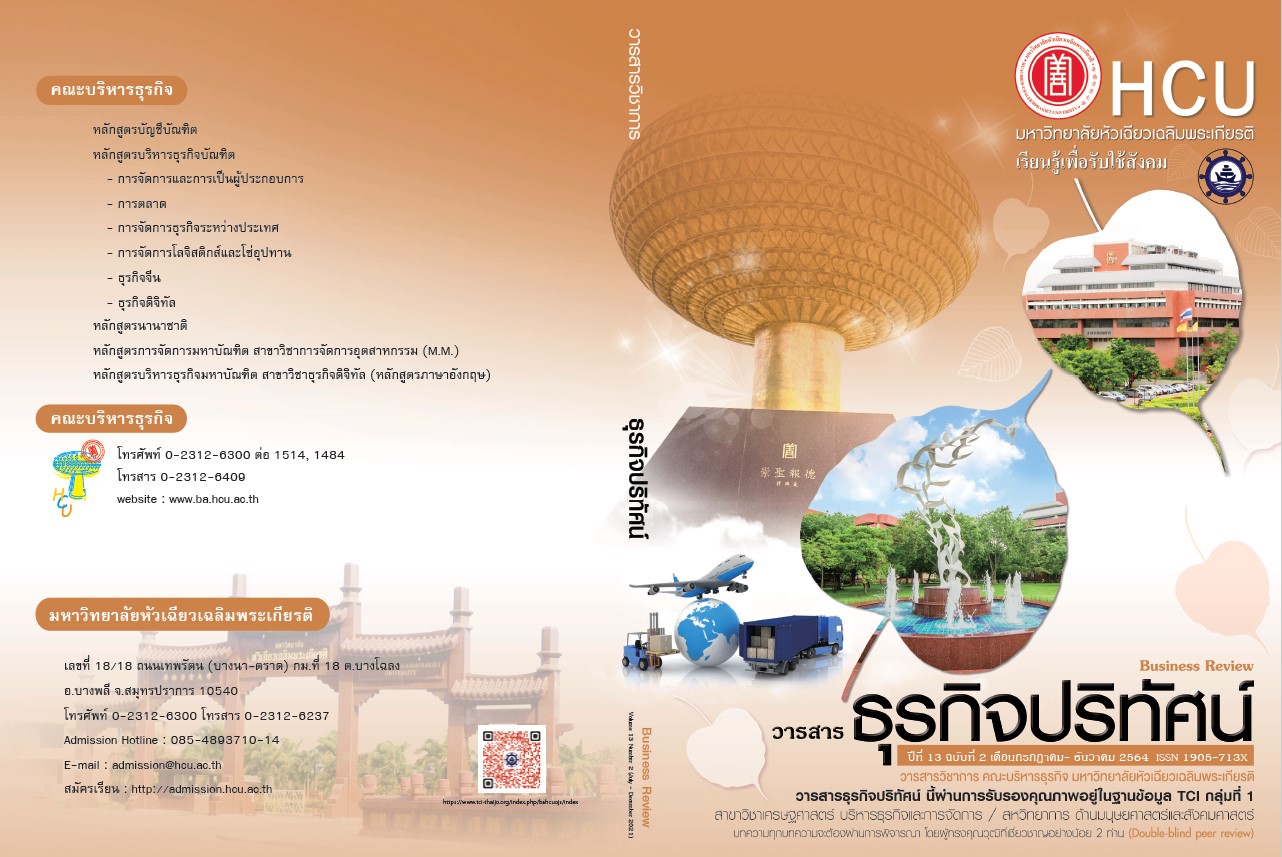The Causal Relationship Between Spa Experience Management, Spa Service Quality, Customer Satisfaction, and Customer Loyalty Toward Day Spas in Bangkok
Keywords:
Spa Experience Management, Spa Service Quality, Satisfaction, Loyalty, Day SpaAbstract
Spa industry is part of wellness tourism. Thailand is seen as a spa destination among tourists. It can be seen from the growing value of the Thai spa industry. This research was aimed at examining direct and indirect effects of the causal relationships between spa experience management, spa service quality, customer satisfaction, and customer loyalty in the context of day spas established in Bangkok. Quantitative method research was adopted. Questionnaire was developed to serve as a research instrument to collect the required data from 400 Thai respondents who had received spa services from day spas in Bangkok. Purposive sampling was a technique of questionnaire distribution. Descriptive statistics and structural equation modelling were used to analyze the data and information.
The results revealed that spa experience management had direct effects on customer satisfaction and customer loyalty. Meanwhile, spa service quality exerted direct effects on customer satisfaction but not directly influencing customer loyalty. Besides, it was found that customer satisfaction played a mediating role in the relationships between spa experience management and customer loyalty and between spa service quality and customer loyalty.
References
กองสถานประกอบการเพื่อสุขภาพ กรมสนับสนุนกิจการเพื่อสุขภาพ. (2564). สืบค้นจาก http://spa.hss.moph.go.th/count_data.php เมื่อวันที่ 29 เมษายน 2564
Abbas, B., Ghaleb, A.-a., and EL-refae, A. (2012). The Relationships Between Service Quality, Satisfaction, and Behavioral Intention of Malaysian Spa Center Customers. International Journal of Business and Social Science, 3(1), 198-205.
Anaya-Aguilar, R., Gemar, G., and Anaya-Aguilar, C. (2021). Factors Associated with Spa Tourists' Satisfaction. Mathematics, 9(332), 1-14.
Barlow, J., and Maul, D. (2000). Emotional Value-Creating Strong Bonds with Your Customers. San Francisco: Berrette-Koehler Publishers.
BMI Research. (2017). Thailand Tourism Report Q2 2017. ISSN: 1747-9037.
Bujisic, M., Bilgihan, A., and Smith, S. (2015). Relationship Between Guest Experience, Personality Characteristics, and Satisfaction: Moderating Effect of Extraversion and Openness to Experience. Tourism Analysis, 20, 25-38.
Cardozo, R. N. (1965). Customer Satisfaction: Laboratory Study and Marketing in Action. Journal of Marketing Research, 2, 244-249.
Carmen, R., Wilson, V., and Betsy L., M. (2007). Understanding Power and Rules of Thumb for Determining Sample Sizes. Tutorials in Quantitative Methods for Psychology, 3(2), 43-50.
Davidson, R. (1992). Tourism in Europe. London: Pitman Publishing.
Division of Research Administration and Education Quality Assurance. (2016). The Thailand 4.0 Model Blueprint: Driving the Country to Properousity. Stability and Sustainability. Retrieved from http://www.libarts.up.ac.th/v2/img/Thailand-4.0.pdf on 10 July 2017
Fatma, S. (2014). Antecedents and Consequences of Customer Experience Management - A Literature Review and Research Agenda. International Journal of Business and Commerce, 3(6), 32-49.
Fornell, C., Johnson, M. D., Anderson, E.W., Cha, J., and Bryant, B. E. (1996). The American Customer Satisfaction Index: Nature, Purpose and Findings. Journal of Marketing 60, 7-18.
Hair, J. F., Black, W. C., Babin, B. J., and Anderson, R. E. (2010). Multivariate Data Analysis (7 Ed.). Upper Saddle River, NJ: Prentice Hall.
Khan, I., Garg, R. J., and Rahman, Z. (2015). Customer Service Experience in Hotel Operations: An Empirical Analysis. Procedia - Social and Behavioral Sciences, 189, 266-274.
Krungsri Bank Public Company. (2005). Economic Benefits via Service Industry. Economics Outlook. Retrieved on 10 November 2020 from http://www.krungsri.com/PDF/ECONOMY/ANALYSIS/oct47_02_pdf
McDougall, G. H.G., and Levesque, T. (2000). Customer Satisfaction with Services: Putting Perceived Value into the Equation. Journal of Service Marketing,14(5), 392-410.
Meyer, C., and Schwager, A. (2007). Understanding Customer Experience. Harvard Business Review, 85(2), 117-127.
Loke, Z. (2020). Investigation of Medical and Wellness Tourists of A Hungarian Spa to Explore Relationships Between Service Quality, Customer Satisfaction and Loyalty. The Central European Journal of Regional Development and Tourism, 12(1), 102-118.
Lomax, R. G., and Schumacker, R. E. (2012). A Beginner's Guide to Structural Equation Modelling. New York, NY: Routledge Academic.
Lovelock, Christopher H., Wirtz, Jochen. and Keh, Hean Tat. (2002). Services Marketing in Asia: Managing People, Technology and Strategy. London: Prentice-Hall.
Office of Permanent Secretary - Ministry of Tourism and Sports. (2017). The 2017 Survey of Attitude and Satisfaction Among International Tourists. Bangkok: Ministry of Tourism and Sports.
Office of Trade and Logistics Services, Department of International Trade Promotion. (2015). Thai Spa Business. Retrieved on 2nd March 2021 from https://www.ditp.go.th/contents_attach/143532/143532.pdf
Oliver, R. L. (1980). A Cognitive Model of the Antecedents and Consequences of Satisfaction Decisions. Journal of Marketing Research, 17, 460-469.
Oliver, R. L. (1997). Satisfaction: A Behavioral Perspective on the Consumer. New York: McGraw-Hill.
Parasuraman, A., Zeithaml, V., and Berry, L. (1988). SERVQUAL: A Multiple-Item Scale for Measuring Consumer Perceptions of Service Quality. Journal of Retailing, 64(1), 12-40.
Piriyapada, S. (2020). A Path Analysis of the Influence on Customer Experience and Brand Prestige on Chinese Visitor Loyalty in Luxury Wellness Service. Journal of Business Administration, Thammasat University, 43(167), 82-105.
Quintela, J., Correia, A., and Antunes, J. (2011). Service Quality in Health and Wellness Tourism - Trend in Portugal. International Journal of Business, Management and Social Sciences, 2(3), 1-8.
Rad, N. F., Som, A. P., and Zainuaddin, Y. (2010). Service Quality and Patients' Satisfaction in Medical Tourism. World Applied Sciences Journal, 10, 24-30.
Rawson, A., Duncan, E. and Jones, C. (2013). The truth about customer experience. Harvard Business Review, Vol. 91 No. 9, pp. 90-98.
Rust, R. T., and Oliver, R. L. (1994). Service quality: Insights and Managerial Implications from the Frontier. In R.T. Rust & R.L. Oliver (Eds.), Service Quality: New Directions in Theory and Practice (pp. 1–20). Thousand Oaks, CA: Sage Publications.
Sarasin, K. (2020). BCG Model General Assembly in the Field of Tourism. Retrieved 13th May 2021 from https://www.nstda.or.th/th/news/13419-bcg-conference-2020
Sundbo, J., and Darmer, P. (2008). Creating Experiences in the Experience Economy. Cheltenham: Edward Elgar Publishing.
Tapar, A. V., Dhaigude, A. S., and Jawed, M. S. (2017). Customer Experience-Based Satisfaction and Behavioural Intention in Adventure Tourism: Exploring the Mediating Role of Commitment. Tourism Recreation Research, 42(3), 344-355.
Thipbharos, P., and Sivapitak, S. (2020). The Characteristics of the Business Operations of Day Spa Enterpreneurs in Thailand. Saint John's Journal, 370-378.
Villnger, N.D.(2008).Using Management Frameworks to Understand Tourism in Thailand: Challenges in the Industry 1997-2007. Journal of Global Business Issues. 2(2): 157-164.
Vryoni, S., Bakirtzoglou, P., and Ioannou, P. (2017). Customers' Satisfaction and Service Quality of Spa Centers in Greece. Acta Kinesiologica, 11, 12-18.
Wetprasit, P. (2019). Evaluation of Tourists' Spa Experiences in Thailand. Journal of International Studies, 9(1), 107-137.
Wijaithammarit, S., and Taechamaneestit, T. (2012). The Impact of Customer Experience Management on Customer Loyalty of Supercenter's Shopper in Thailand. International Journal of e-Education, e-Business, e-Management, e-Learning, 2(6), 473-477.
Zeithaml, V. A., and Bitner, M. J. (2003). Service Marketing: Integrating Customer Focus Across the Firm. 3rd ed. Boston: McGraw-Hill.
Zomerdijk, L. G. and Voss, C. A. (2011). NSD Processes and Practices in Experiential Services. Journal of Product Innovation Management, vol. 28, no. 1, 63–80.
Downloads
Published
How to Cite
Issue
Section
License
All articles published in the Business Administration and Management Journal Review are copyrighted by the journal.
The views and opinions expressed in each article are solely those of the individual authors and do not represent those of Huachiew Chalermprakiet University or any other faculty members. Each author is fully responsible for the content of their own article. Any errors or issues found are the sole responsibility of the respective author.




